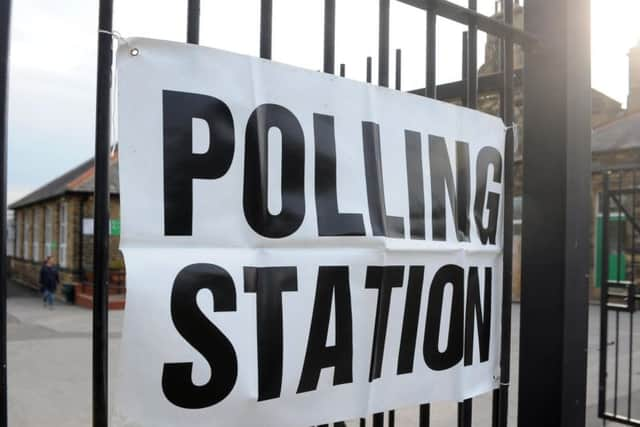EU nationals speak of their anger after being denied their vote at Leeds polling stations


Citizens from EU countries have told how they turned up to vote, only to be told they were unable to due to letters marked next to their names, or miscommunications between the council and Electoral Commission.
One Dutch woman told the Yorkshire Evening Post she was turned away, before researching her rights and going back demanding she be allowed to cast her vote.
Advertisement
Hide AdAdvertisement
Hide AdAnother Polish woman who was entitled to vote was reportedly turned away because Leeds City Council had not received the letter declaring her intention to vote in this country from the Electoral Commission.


Saskia Roskam, who has lived in the UK for eight years and runs her own business here, said she was turned away from the polling station at Harehills Lane Baptist Church after volunteers at the station saw a letter 'G' had been marked next to her name.
The code refers to people who are EU citizens legally allowed to vote in UK elections.
Saskia, 36, who is originally from Amsterdam and runs a bakery delivery company from home, said: "I arrived at the polling station and didn't have my polling card but brought my passport. The woman asked me my address and when I told her, she said I had a letter 'G' marked next to my details and my name had been crossed out, meaning I couldn't vote."
Advertisement
Hide AdAdvertisement
Hide AdSaskia went home and rang her friend and business partner Lisa Shepherd, who is originally from Germany, who told her to research it and go back.
She added: "I Googled 'electoral vote letter G' to find out what it stood for, then went back and demanded I be allowed to vote. The woman made a call and luckily in the end I was given a ballot paper and allowed to vote. It just made me angry because I know there will have been other people possibly turned away because of this who didn't have time to research their rights or just left it and have therefore missed out."
Thursday's election is the first Saskia has voted in while living in Britain, due to being unable to vote in 2016's referendum.
"This is the first time EU nationals have a chance to say anything [since Brexit], so for me it was a very important thing and to be told I couldn't was extremely disappointing."
Advertisement
Hide AdAdvertisement
Hide AdPeter Packham from the group Leeds for Europe, said the group's Facebook page was sent a message after a Polish lady was turned away from a polling station "because Leeds City Council had not received the registration letter from the Electoral Commission", adding that it was sent "on 24 April".
He added: "The lady didn't let it rest, she was told six times she could not vote, but was insistent and eventually they found her on the [roll] and she has now voted".
Meanwhile Martin Cadek, a PhD student at Leeds Beckett, said he didn't receive his ballot.
He tweeted to say: "Completed online registration but as I didn't receive my ballot I called #Leeds Council. I was told that I can't vote because a form to confirm that I really wish to vote where I live was required to be filled".
Advertisement
Hide AdAdvertisement
Hide AdA spokeswoman for the Electoral Commission said: “We understand the frustration of some citizens of other EU Member States, resident in the UK, who have been finding they are unable to vote today when they wish to do so.
“This legal process could be made easier for citizens, and the Commission made the case for doing so following the last EU elections in 2014. However, improvements to the process are reliant on changes to electoral law, which can only be taken forward by Government and Parliament.
“The very short notice from the government of the UK’s participation in these elections impacted on the time available for awareness of this process amongst citizens, and for citizens to complete the process. EU citizens’ right to vote in the election in their home Member State remains unaffected by the change in the UK’s participation; in order to do so, they would need to be registered in that country in accordance with that country’s process and timetable.”
A spokesman for Leeds City Council said: "We are aware of isolated cases where electors have been turned away from polling stations. To reassure voters, we have contacted all Presiding Officers to remind them of our guidance for determining voter eligibility.
Advertisement
Hide AdAdvertisement
Hide Ad"Every polling station has a list of EU citizens registered to vote in their area. Polling staff have been advised to contact the Elections team before turning any potential voters away, who will try to resolve any cases reported."
Am I entitled to vote?
If you are a British citizen and have registered to vote, yes. EU citizens must have registered to vote from their UK address in the EU Parliamentary elections to take part in Thursday's vote.
EU nationals are marked out by letters next to their details on the electoral roll given to polling station volunteers, although these do not necessarily mean the individual is not allowed to vote. You can see more details on who is and isn't allowed to vote on the electoral commission website here.
How and when do I vote?
Provided you are registered to vote (the deadline to register for these elections passed on 7 May), you vote in the same way you would for a general or council election.
Polling stations will open from 7am and close at 10pm on 23 May, with results expected on Sunday.
You can see more details on today's elections and the candidates for Yorkshire here.
